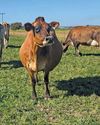Essayer OR - Gratuit
Crop Diversity A Pillar Of Sustainable Production
Farmer's Weekly
|August 9, 2019
Including more than three crops in a cash crop system may not only help increase yield, but significantly enhance the long-term sustainability of a farm. Dr Johann Strauss of the Western Cape Department of Agriculture spoke to Glenneis Kriel about the benefits of crop diversity.
-

Around the world, a growing number of farmers are switching to crop rotation due to its capacity to improve farm earnings through higher yield and reduced fertiliser, pesticide and herbicide usage, while boosting sustainability.
Long-term rotation trials by the Western Cape Department of Agriculture at the Langgewens Research Farm in the Swartland and Tygerhoek in the Southern Cape confirm this.
In crop rotation evaluations that started at Langgewens in 1996, wheat monoculture has always been the poorest performer of all the combinations under trial. But in rotations that included at least one type of legume, such as lupines or medics, the average wheat yield was 30% higher than when wheat was produced in a monoculture. The yields of rotations containing no legumes were on average 12% higher.
BEST ROTATION
A medic-canola-medic- wheat rotation consistently performed the best, producing an average yield 37% better than a system where wheat was produced on its own (see table).
Water- and nitrogen-use efficiency also improved. Wateruse efficiency of rotations that included canola was 11% higher, and rotations that included one or more years of legume crops or pastures were between 26% and 31,6% higher than when wheat was planted on its own.
Nitrogen-use efficiency was on average 89% better in rotations that included legumes than when wheat was produced alone, and 35% better when the rotation included only one year of legumes. The use of canola in the rotation, without any legumes, increased nitrogen-use efficiency by 9%.
During the past two seasons, of which 2017 was dry and 2018 had below-average rainfall, the researchers set out to establish how low the nitrogen level could be reduced in a medic and wheat rotation.
Cette histoire est tirée de l'édition August 9, 2019 de Farmer's Weekly.
Abonnez-vous à Magzter GOLD pour accéder à des milliers d'histoires premium sélectionnées et à plus de 9 000 magazines et journaux.
Déjà abonné ? Se connecter
PLUS D'HISTOIRES DE Farmer's Weekly
Farmer's Weekly
Farmers 'unilateral victims' of climate
Gyeongbuk Provincial Council member Choi Taerim has demanded immediate and substantial support for apple farmers in the South Korean province, urging immediate measures for apple farmers affected by heat damage be implemented, The Asia Business Daily recently reported.
1 min
November 21-28, 2025

Farmer's Weekly
Top agri workers celebrated in the Western Cape
Shannon Robertson, assistant livestock manager at Boschendal near Franschhoek, was crowned the overall winner of the 2025 Western Cape Prestige Agri Awards, held in Durbanville.
1 min
November 21-28, 2025

Farmer's Weekly
Smart dairying: running Jerseys on pasture
The dairy farming sector has seen innovation in milk parlour and cow comfort technology that have allowed farmers to not only yield higher volumes, but extend the productive lifespan of their cows. Albrecht de Jager told Henning Naudé about his approach to maintaining a pasture-raised Jersey herd while utilising precise data measuring technology to ensure quality milk output and optimal cow comfort.
6 mins
November 21-28, 2025

Farmer's Weekly
High-performance dairy farming in the Eastern Cape: the Rufus Dreyer approach
Dairy farming is often described as one of the most technically demanding and strategically complex branches of agriculture.
6 mins
November 21-28, 2025

Farmer's Weekly
Design your stables and camps to assist in AHS control
Keep horses away from areas where disease-carrying midges multiply, like natural pools, lakes, streams and dams, advises Dr Mac.
2 mins
November 21-28, 2025

Farmer's Weekly
The rolling chant that has echoed through SA over the past 30 years
Johan van der Nest is renowned in auction circles and was the first freelance stud-stock auctioneer to begin operating in South Africa.
10 mins
November 21-28, 2025

Farmer's Weekly
Flight from the Red Army
The fall of the Third Reich in 1945 was defined by the Red Army's brutal invasion of Germany. Mike Burgess tells how the Hoppe family trekked from Finowfurt near Berlin to Preetz in Schleswig-Holstein to escape the brutality.
6 mins
November 21-28, 2025

Farmer's Weekly
How to plan a pre-sale feeding programme
Proper feeding of animals before a sale can help producers catch the eye of buyers and increase profits, but it is important to choose the right ration.
8 mins
November 21-28, 2025

Farmer's Weekly
How women are transforming coffee production in Kenya
A group of Kenyan smallholder women farmers are transforming the country's high-value coffee sector by pooling their resources.
5 mins
November 21-28, 2025

Farmer's Weekly
Tough times ahead for SA's grain farmers
Grain farmers face a difficult year ahead with lower grain prices and high production costs
3 mins
November 21-28, 2025
Translate
Change font size

